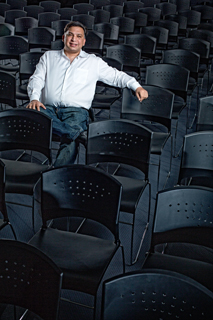

Executive edge: Vic Ahmed
Lynn Bronikowski //July 1, 2012//

Tucked in the Denver Tech Center is Innovation Pavilion, an energetic place where ideas are born. Its founder, Vic Ahmed, hopes the next Google, Facebook or Groupon will strike within.
“This incubator has been a four-year journey for me,” said Ahmed, who opened the doors on his 80,000-square-foot dream in November and today houses 42 startup companies. “We’re no longer an incubator but an ecosystem for entrepreneurs.”
Ahmed knows something about entrepreneurship, having started so many companies he can’t even count. “But at least 15 to 20,” he said. Before opening Innovation Pavilion, he researched incubators across the country, settling on Silicon Valley’s Plug and Play – a community of more than 300 startups from around the world – as his model.
Among the companies just getting started is one run by students from Regis University. Ahmed maintains a close relationship with universities because, he says, “Students are enthusiastic; they think outside the box and they believe they can change the world.”
Ahmed wouldn’t disclose what the Regis students are working on, suggesting a return visit when they’re ready to announce their great idea.
“Our plan for Innovation Pavilion is quite ambitious. We’re planning for multiple buildings in Denver so if things continue to go as they are, we may close on our next building by the end of the year,” said Ahmed, who has his brothers, Umer Farouq and Ali Usman helping run the incubator. “Being here is like being in a candy shop, and it seems my entire background fits into this.”
Ahmed, who currently is CEO of Englewood-based BusinessGenetics, a software company, came to the United States from Pakistan as a student attending Washington University in St. Louis, where he majored in computer science and systems engineering.
“My first semester I took a course in systems engineering. The first assignment was to make a mathematical formula for parallel parking. That was an epiphany for me – applying math to real-life issues – and I knew that’s what I wanted to do,” said Ahmed, 49.
His father was a civil engineer and his mother a housewife. He believes his entrepreneurial spirit is rooted in his heritage.
“Over in Pakistan, entrepreneurship is in your DNA because survival is facing you every day of your life,” he said. “It’s not like growing up here where you get your food and shelter. Where I come from, you worry about that, and if you don’t get a degree, if you don’t get some skills, if you don’t do something meaningful, you’re going to starve. You look around and see the reality of life and say, ‘I’m going to work hard or I’m going to starve,’ so the incentives are high.”
Following the devastating floods in Pakistan in 2011, Ahmed returned to his native country.
“We visited the most flood-affected areas, and it was unexpectedly not heartbreaking but uplifting,” Ahmed said. “Whenever I would visit, it was always a downward spiral, but this time we found out how simple it was to find a mechanism for these families to sustain themselves without pouring a bunch of money into it. For the first time ever, I saw real hope for the country.”
He considers himself lucky to have his hands in so many areas – whether it be running his software company, expanding Innovation Pavilion or creating a program to help his native land.
“Being involved in so many things, at least one of them is doing really well,” he said. “So I focus my attention on that first thing when I wake up, and that uplifts my energy and I’m enthused throughout the day.”



























